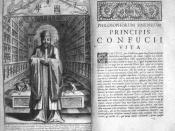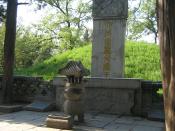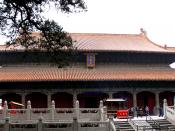Equilibrium and harmony is the core of the Confucianism
Introduction
Confucius (Ã¥ÂÂ夫åÂÂ,K'ung-fu-tzu or Master K'ung) is great thinker who lived in Spring and Autumn Period (æÂ¥ç§Âæ°åÂÂ) . He was the founder of School of the Literati (Ã¥ÂÂ家,Ju Chia), one of the six schools of Chinese philosophy(http://www.friesian.com/confuci.htm ). It focuses on human morality and good deeds. Confucianism is a complex system of moral, social, political, philosophical, and quasi-religious thought that has had immeasurable influence upon Asian intellectual and social history.
Many scholars often said propriety(禮) and benevolence(ä»Â) constitute the basis of Confucianism, but the propriety and benevolence can be only called the moral standard of the Confucianism and could not be interpenetrated all realms of the system of the Confucianism as a center clue. However Equilibrium and harmony(ä¸ÂÃ¥ÂÂ) that contains the idea of yin(é°) and yang(é½) (world outlook), harmony and similar (methodology), the doctrine of the mean (on morality) and Heaven and human being in one (value outlook) has successful effects.
Therefore we consider that Equilibrium and harmony as the core of the Confucianism.
Equilibrium and harmony is the core of the Confucianism
From the early to modern Confucianism, is there a core in it? In other words, is there a consistent line in it? This is a question that the academic community has always been evaded. Some people are trying to use the "Benevolence(ä»Âå¸)" and "rule by moral example(å¾·æ²»)" and so on to interpret the concept of Confucianism, but most of them failed to do so. Because the core meaning of Confucianism is too abstract to be interpreted (P.J. Ivanhoe, 1993, pp.56). Then, what is the core idea of the Confucianism? The author believes that the core meaning must at least have two conditions: First, it must be the most important thing and the internal soul of the doctrine and...


